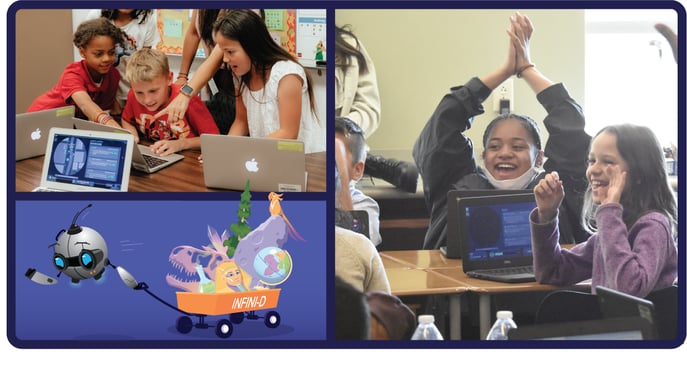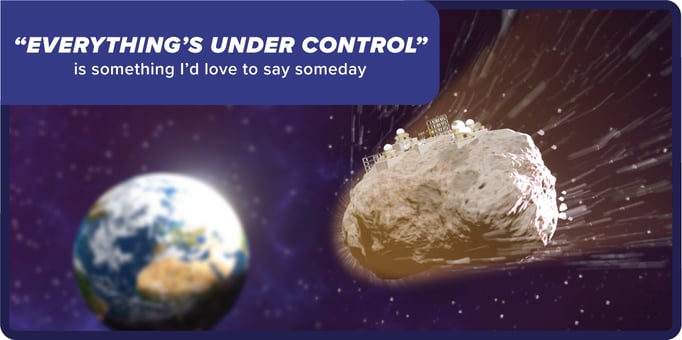Share this
The Teaching Tool That's So Good, You'll Forget It's Not Perfect (Yet)
by Orsi Szecsi on October 3, 2023
Mission.io is not perfect. I'll just say it. But it's still the best educational tool you are ever going to use.
Why? Because it's fun, engaging, and relevant. Seriously. I know, you're thinking, "Education should be serious!" But hear me out.
When students are having fun, they're more engaged. And when they're engaged, they learn more. A recent study by Learning Science International found that students who are highly engaged in school are 2.5 times more likely to have better grades and do well in school. Also, students who are highly engaged in their studies are more likely to attend school regularly, participate in class activities, and complete their homework.
 This is where Mission.io comes in. Our program is everything a classroom should be. Students hop on our "Magic School Bus," are transported to different worlds and scenarios, and have to work together to solve problems. The program revolutionizes the way you teach STEM and helps students develop important 21st-century skills like teamwork, critical thinking, and problem-solving. The best part is the kids will have fun doing it.
This is where Mission.io comes in. Our program is everything a classroom should be. Students hop on our "Magic School Bus," are transported to different worlds and scenarios, and have to work together to solve problems. The program revolutionizes the way you teach STEM and helps students develop important 21st-century skills like teamwork, critical thinking, and problem-solving. The best part is the kids will have fun doing it.
Of course, Mission.io is not a magical unicorn. It's not going to make all of your students straight-A learners overnight, but it will help them to learn more effectively and develop the skills they need to succeed outside of the classroom and in the future.
Imperfections and why they don't matter
While Mission.io is a very powerful educational tool like a magic wand, it’s not perfect (yet). The world of education is changing rapidly. New technologies and teaching methods are emerging all the time. We are committed to bringing the program into the hands of as many teachers as possible. That's right. We're so excited to get Mission.io into the hands of students everywhere that we sometimes forget to slow down and think about everything.
It’s like a bunch of passionate adults are trying to build a spaceship in our garage overnight, but we're learning. And we're getting better. We're listening to our users and to students, and we're constantly improving the program and missions. We believe that Mission.io has the potential to make a real difference in the way we look at learning.
It's not always easy to use. Just like with any other technology, it can take some time to learn how to use it effectively. You might run into some issues and get lost middle of the mission, but that’s just part of the fun. Our team at Mission.io is constantly working on improving the user experience, giving you the resources to help you get started, and listening to all your needs. We know that teachers are busy, so we're making changes to the platform based on teacher feedback to create less work for you.
It doesn’t always have missions that align with a specific topic. Our missions library is constantly growing, and we have missions for a variety of subjects and grade levels. We know that teachers have a lot on their plates, so we make it easy to find missions that align with your curriculum. But what if there isn't a mission for the specific subject you're looking for? Don't worry! You can always customize questions for missions to fit your needs.
It might not always have the features you need. We're on a mission to create the most immersive and engaging educational experiences possible. We're a new company, but we're growing fast and making waves. We know that every teacher is different, and that's why we're constantly adding new features to meet teachers’ needs. We want Mission.io to be your one-stop shop for all things education, so whether you're teaching math, science, or literacy, we've got you covered.

Why Mission.io will become your favorite tool
So, now that we've gotten the imperfections out of the way, let's talk about why Mission.io is going to become your favorite teaching tool.
Imagine a world where your students are excited to come to school. Where they're begging you for more assignments. Where they're collaborating with their classmates to solve real-world problems.
That's the world of Mission.io!
It's student-led. We are putting students in the driver's seat of their own learning. They are responsible for making decisions, solving problems, and collaborating with each other to achieve the mission goal. We're putting students in control and steering them away from traditional teaching methods. Because let's be honest, traditional teaching methods are kind of boring. And we want our students to be anything but boring. With Mission.io, students get to learn in a way that is fun, engaging, and relevant to them. They'll be working on tasks that are challenging and rewarding, and they'll be doing it alongside their classmates.
It's engaging. Our missions are so engaging, that your students will forget they're even learning. It's like a math equation: engagement + motivation = learning. But instead of solving for x, you're solving for real education time. Every single mission is built on radical engagement, which means it's designed to be fun for students of all ages. If you're looking for a way to get your students' attention and bring some flare into your lessons, Mission.io is the answer. The worst that can happen is your students will have so much fun learning, they'll forget to go to recess. One more thing to mention, in 2023, 93% of our users reported an increase in student excitement for school when they incorporated missions.
It's collaborative. The missions are so collaborative that your students will learn how to "be together" even if they're not sure they want to. It's like a real-life social experiment but with more robots, higher stakes, and real outcomes. A study by the World Economic Forum found that collaboration is one of the top 10 skills that will be in demand in the workplace by 2025. It might be just the only collaboration program they'll ever need (and actually enjoy).
It's real-world problem-solving. All of the missions are real-world problem-solving at its finest. Students won’t just learn about math and science concepts in a vacuum. They're going to use those concepts to solve real-world problems that matter. For example, in one mission, students have to come up with a solution to save a city from landslides. In another mission, students have to design a solution to eliminate an infestation in the ocean. The best part: the missions aligned with national and state standards.
It's relevant. Our program can make even the driest topic fun. Like learning about gravity. Sure, you could just teach your students about gravity using a textbook and a diagram, but that would be boring. Instead, you can send your students on a mission where gravity is out of control. Maybe a low-gravity asteroid has landed on Earth, or maybe the planet's gravity has suddenly doubled. That's what makes Mission.io so relevant. It can be used to teach any subject, from math and science to ELA. Also, it can be used to introduce new concepts, reinforce existing concepts, or provide students with an opportunity to practice and apply their skills.
Did I convince you yet that learning with our program will be everything you hoped and dreamed of? If not, I’m not done yet!

5 Tips on How to Get Started
We built a powerful tool that can help teachers revolutionize the way they teach STEM and 21st-century skills. But where do you start?
#1: Don't be afraid to dive in
The best way to learn to swim is to jump in the pool. The same is true for Mission.io. Don't worry about figuring out everything before you start. Just start using it and you'll learn as you go. Plus, we have a library filled with training videos.
#2: Get your students ready
To get the most out of the learning experience, your students need to be ready for the challenge. Tell your students that they are going on an exciting mission to save the world (or at least their classroom). Explain to your students that they need to be prepared to know the subject, work together, follow instructions, and stay on task. Let them know that it's okay to make mistakes, but that they should always be trying to learn from those mistakes.
#3: Start with baby steps
Run the training missions first. It's like training wheels for your brain. It's super simple, but it'll get you and your students up to speed on how to use our program. Once everyone has survived the first roller coaster ride, you can move on to the curriculum missions where the real fun (and maybe a few tears) begins!
#4: Don't be afraid to ask for help
If you get stuck, don't be afraid to ask for help from other advocate teachers or from the Mission.io team. Rest assured, you are not the only one who has the same question. We are very responsive and helpful; teachers think we're a bunch of insomniacs (which is kind of true).
#5: Have fun
The entire journey will be fun. Well, more like chaoticly organized fun. Don't be afraid to let your students take charge of their own learning. Imagine a classroom where students are out of their seats, talking to each other, laughing out loud, and getting super excited. That's what you can expect when you run a mission. But don't worry, it's all in the name of learning. It's a classroom where students are using Mission.io to learn. So, let your students lead, grow, fail, and learn from their mistakes.
Here is the thing: the future of education is here. The world is changing rapidly, and education needs to change with it. We need to prepare our students for the jobs of the future, and those jobs will require creativity, problem-solving, and collaboration. We truly believe that education should be fun.
And Mission.io makes education fun!
References
Reuell, P. (2019, September 4). Lessons in learning. The Harvard Gazette. Retrieved September 27, 2023, from https://news.harvard.edu/gazette/story/2019/09/study-shows-that-students-learn-more-when-taking-part-in-classrooms-that-employ-active-learning-strategies/
Whiting, K. (2021, October 1). These are the top 10 job skills of tomorrow – and how long it takes to learn them. World Economic Forum. Retrieved September 27, 2023, from https://www.weforum.org/agenda/2020/10/top-10-work-skills-of-tomorrow-how-long-it-takes-to-learn-them/
Share this
- February 2026 (4)
- January 2026 (4)
- December 2025 (3)
- November 2025 (1)
- October 2025 (4)
- September 2025 (2)
- August 2025 (6)
- July 2025 (9)
- June 2025 (8)
- May 2025 (6)
- April 2025 (4)
- March 2025 (4)
- February 2025 (1)
- May 2024 (1)
- March 2024 (1)
- February 2024 (1)
- January 2024 (3)
- November 2023 (1)
- October 2023 (1)
- September 2023 (4)